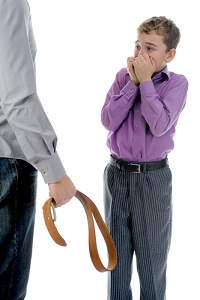 Spanking: Just the word is enough to make some people shudder with the memory of a punishment that went too far. Although fewer children are spanked today than in the past, the practice still persists, despite evidence of the harm it causes. There is no shortage of sociological evidence that spanking a child is harmful to their physical health and psychological well-being.
Spanking: Just the word is enough to make some people shudder with the memory of a punishment that went too far. Although fewer children are spanked today than in the past, the practice still persists, despite evidence of the harm it causes. There is no shortage of sociological evidence that spanking a child is harmful to their physical health and psychological well-being.
It’s imperative that parents, nannies, family members and other caretakers who encourage spanking understand what the practice really means. Here are some reasons you should never spank your child:
It increases the risk of accidental death or severe injury.
Although it may not be your intention to cause serious injury or death, it has happened numerous times. The risk should not be underestimated. In 2008, for example, more than 1,700 children died as a result of either abuse or neglect, and adults in a rage often don’t realize their own strength and the fragility of children’s bodies. Inflicting physical harm on a child, even in a “controlled” situation, is always risky. Besides injuring a child’s muscles, it’s possible to damage his internal organs.
It teaches improper social values.
Spanking means treating a child like an object, not a human being, and it’s a punitive measure that devalues children overall. This can have any number of negative side effects: children might come to equate punishment with pain or assume that loving relationships are built on physical corrections. Spanking passes on a lack of respect for others.
It causes psychological harm.
Damage done to a child’s mind may not appear until years later. Sometimes, the harm may take the form of an inhibited personality, but at other times it can manifest as a neurotic or psychotic problem when children get into their teen or adult years. All forms of child abuse, even those rendered in the name of punishment, have long-term effects. Spanking has been shown to erode developmental growth and cause serious harm. Moreover, children look at their parents as a source of love, and spanking can make a child feel unwanted and unloved. Even if the parent later makes up for the spanking, the damage has been done because the sense of trust has been broken.
It encourages violence.
Unfortunately, children who are spanked tend to spank their own children, continuing the cycle of violence down through the generations. Psychiatrist Alice Miller found that abusive parents, criminals, tyrants and dictators all had one thing in common: an abusive childhood. Fortunately, not every abused child becomes violent when they grow up, though sometimes the violence is inner-directed through harmful addictions like drug or alcohol. Spanking your child plants the seed of the idea that violence solves problems.
It can damage personality.
A 2012 study found that spanking was associated with an increased risk of mental disorders in adulthood. In other words, if someone is spanked as a child, he’s more likely to grow up struggling with alcohol and substance abuse, anxiety or mood disorders, or more. What more parents have to realize is that abuse doesn’t just manifest itself in the classical forms (extreme physical or sexual assault) that most people recognize; it can be as “mild” as spanking and still be just as damaging to a child’s future.
Spanking is not a solution to childhood misbehavior. There are other ways of correcting a child that do not have negative consequences. A trusting relationship with a child will allow both the parent and the child the opportunity to engage in a meaningful discussion. Parenting is about forging a bond with your child, and spanking can damage that bond beyond repair.